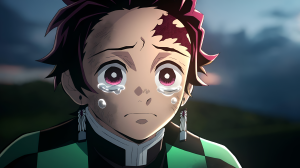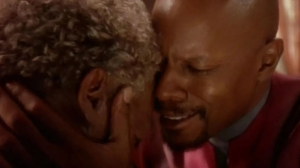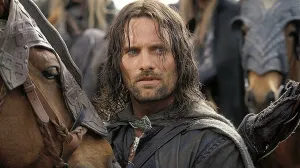2018 has been a good year for black superhero stories. In theaters, Marvel‘s Black Panther is smashing box office records. On television, DC‘s Black Lightning is showing strong ratings and has a strong fan following of its own and both the movie and The CW series depict black heroes within predominately black communities, albeit one a fictional African nation and the other a fictional American city.
Videos by ComicBook.com
However, despite the major differences between Black Panther and Black Lightning, the two are in a sense two sides of the same coin as both the Marvel film and the DC television series show what justice and heroism look like — depending on the path you take, particularly if you consider the journey of Black Panther‘s Killmonger.
In Black Panther, Killmonger devotes his life to seeking justice for both his father’s death and the wrongs done to him and the rest of his community in the form of revenge on those he blames for it all — Wakanda, particularly the Wakandan royal family. You see, Killmonger is the son of the late King T’Chaka’s brother, N’Jobu. N’Jobu was serving undercover in Oakland, California when, disillusioned by Wakanda turning a blind eye to the struggle of others of African heritage in the world, assists black-market arms dealer Ulysses Klaue in stealing Wakandan vibranium. T’Chaka confronts N’Jobu, but the confrontation ends in N’Jobu’s death.
Instead of taking N’Jobu’s young son, Erik, to Wakanda, T’Chaka leaves the child behind in the violent and uncertain world that is Oakland. This deeply impacts Erik. He grows up to become a vicious, violent black ops soldier with the nickname Killmonger and plays a long con with Klaue that leads him to Wakanda where he takes the throne from T’Chaka’s son, T’Challa/Black Panther. Killmonger’s ultimate plan is to arm Wakandan operatives and other communities around the world to start a revolution. Killmonger ultimately fails in his plan, however. He is stabbed by T’Challa as they battle for the throne with Killmonger choosing to die rather than be imprisoned.
On Black Lightning, audiences also see the story of a young black man whose father was murdered seek justice but instead of going down a path of revenge, Jefferson Pierce/Black Lightning goes the opposite direction. After his father is murdered, Jefferson chooses a path that leads him to excellence — Jefferson’s not only a former Olympic athlete, but he’s a well-respected and well-educated high school principal. He is also a retired superhero who, in addition to trying to get justice for his father was also dedicated to fighting crime in his community, the fictional Freeland. It’s increased crime and corruption due to the rise of a local gang that brings him out of retirement and while he is still focused on his father’s killer, he also seeks to save Freeland — a predominantly black community. It’s worth noting that while Freeland is fictional, Black Lightning co-showrunner Salim Akil originally planned to set it in Richmond, California — a city near Oakland that happens to be Akil’s hometown.
So, you have two young black men both from the same general community who both lost their fathers to violence at a young age. One chooses a path of justice via revenge while the other chooses a path of justice via trying to change his community directly. And this isn’t a commentary on which path is “right.” Instead, it’s interesting to see how one general theme can create two very different stories. In a sense, Killmonger and Black Lightning each look at how one origin can have very different outcomes and it’s something that gives audiences a chance to explore both — a truly exciting prospect, seeing both sides represented.
And representation is something that is important to both Black Lightning and Black Panther. Black Panther director Ryan Coogler told Fandango earlier this year that the importance of representation can’t be ignored.
“[Black Panther] has the potential to be something that’s really unique in a lot of different ways,” Coogler said. “I think that you can’t ignore the idea of representation and also the excitement around Marvel Studios and the work that they’ve been able to pull off when telling original and unique stories.”
Black Panther is in theaters now.
Black Lightning airs Tuesdays at 9/8c on The CW.








